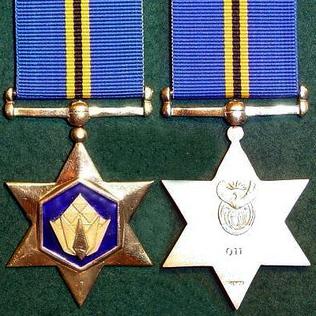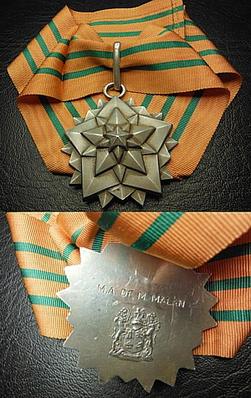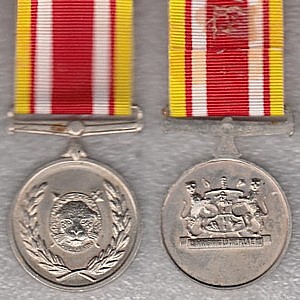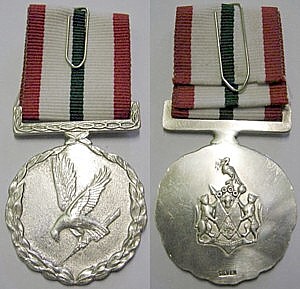
The iPhrothiya yeGolide - Golden Protea, post-nominal letters PG, was instituted by the President of the Republic of South Africa on 16 April 2003 and came into effect on 27 April 2003. It can be awarded to all ranks who have distinguished themselves by exceptional leadership or exceptional meritorious service and the utmost devotion to duty. It is South Africa's highest existing military decoration for meritorious conduct.

The Star of South Africa, post-nominal letters SSA, is a military decoration for merit which was instituted by the Union of South Africa from 1952 to 1975. It was awarded to general and flag officers of the South African Defence Force for exceptionally meritorious service. The Star of South Africa was discontinued on 1 July 1975, when a new set of orders, decorations and medals was instituted.

The Pro Merito Decoration, post-nominal letters PMD, is a military decoration for merit which was instituted by the Republic of South Africa on 1 July 1975. It was awarded to other ranks of the South African Defence Force for outstanding service of the highest order and utmost devotion to duty.

The Star of South Africa, Silver, post-nominal letters SSAS, was the second level decoration of two military and five non-military classes of the Order of the Star of South Africa, which was instituted by the Republic of South Africa on 1 July 1975. It was awarded to general and flag officers of the South African Defence Force for exceptionally meritorious service of major military significance. The Order of the Star of South Africa was discontinued in 2002.
The Star of South Africa, Grand Cross, post-nominal letters SSA, is the senior decoration of five non-military classes of the Order of the Star of South Africa, a South African Military Order that was instituted by the Republic on 1 July 1975. The Order of the Star of South Africa was discontinued in 2002.

The Independence Medal was instituted by the State President of the Republic of Bophuthatswana to commemorate that country's independence on 6 December 1977. It was awarded to all ranks on the active strength of the Bophuthatswana Defence Force upon independence.

The General Service Medal was instituted by the State President of the Republic of Bophuthatswana in 1991, for award to all ranks for operational service inside Bophuthatswana.

The Marumo Medal, Class I was instituted by the State President of the Republic of Bophuthatswana in 1988.

The Defence Force Merit Medal was instituted by the State President of the Republic of Bophuthatswana in 1982, for award to all ranks for extraordinarily excellent service and particular devotion to duty.

The Long Service Medal, Gold was instituted by the President of the Republic of Venda in 1985, for award to all ranks for thirty years exemplary service.

The Sandile Medal was instituted by the President of the Republic of Ciskei in 1988, for award to all ranks for meritorious service.

The Star for Bravery in Gold, post-nominal letters SBG, was instituted by the President of the Republic of South Africa in April 1996. It was awarded to veteran cadres of Umkhonto we Sizwe, the military wing of the African National Congress, who have distinguished themselves during the "struggle" by performing acts of exceptional bravery in great danger.

The Decoration for Merit in Gold, post-nominal letters DMG, was instituted by the President of the Republic of South Africa in April 1996. It was awarded to veteran cadres of uMkhonto we Sizwe, the military wing of the African National Congress, who had distinguished themselves during the "struggle" by outstanding service and utmost devotion to duty.

The Merit Medal in Silver, post-nominal letters MMS, was instituted by the President of the Republic of South Africa in April 1996. It was awarded to veteran cadres of Umkhonto we Sizwe, the military wing of the African National Congress, who had distinguished themselves during the "struggle" by exceptionally meritorious service and particular devotion to duty.

The Bravery Star in Silver, post-nominal letters BSS, was instituted by the President of the Republic of South Africa in April 1996. It was awarded to veteran cadres of the Azanian People's Liberation Army, the military wing of the Pan Africanist Congress, who had distinguished themselves during "the struggle" by performing acts of bravery.

The Star for Conspicuous Leadership, post-nominal letters SCL, was instituted by the President of the Republic of South Africa in April 1996. It was awarded to veteran cadres of the Azanian People's Liberation Army, the military wing of the Pan Africanist Congress, for distinguished conduct and exceptional combat leadership during the "struggle".

The Gold Decoration for Merit, post-nominal letters GDM, was instituted by the President of the Republic of South Africa in April 1996. It was awarded to veteran cadres of the Azanian People's Liberation Army, the military wing of the Pan Africanist Congress, for outstanding service and utmost devotion to duty during the "struggle".

The Silver Medal for Merit, post-nominal letters SMM, was instituted by the President of the Republic of South Africa in April 1996. It was awarded to veteran cadres of the Azanian People's Liberation Army, the military wing of the Pan Africanist Congress, for exceptionally meritorious service and particular devotion to duty during the "struggle".

The Star of South Africa, Commander, post-nominal letters CSSA, is the third highest decoration of five non-military classes of the Order of the Star of South Africa, a South African military order that was instituted by the Republic of South Africa on 1 July 1975. The Order of the Star of South Africa was discontinued in 2002.
The Star of South Africa, Grand Officer, post-nominal letters SSAS, is the second decoration of five non-military classes of the Order of the Star of South Africa, a military order that was instituted by the Republic of South Africa on 1 July 1975. The Order of the Star of South Africa was discontinued in 2002.


















